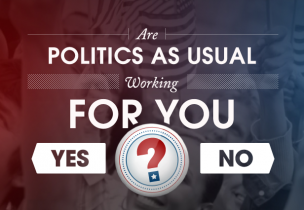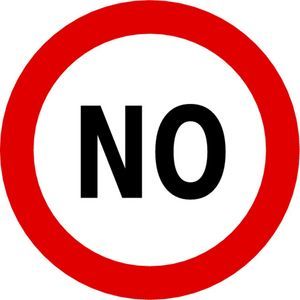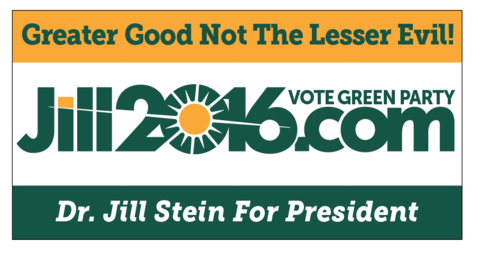The Road Not Taken

Like me, if you're an American citizen, you're probably sick to death of the presidential election cycle. I promise not to delve into my personal political views or rehash the failings of two major party candidates whom, I freely admit, I find utterly unappealing. As a voter, I once again feel backed into a corner: forced to choose between the lesser of two evils. It breaks my heart and saps my optimism. Even worse, I've seen this "systemic two-party gang warfare" completely disgust my teenage sons, who (along with their friends) genuinely believe that the American political system is too broken to fix. I recently heard an interview with a longtime political journalist returning to Michigan after decades stationed in Washington, D.C., who described the toxic environment inside the Beltway as a "duopoly" where the two major parties maintain power by conspiring to subvert any viable competition. I think he nailed it... and that prompted me (against my better judgment) to share my own frustration.
This isn't a trivial problem to solve, and it isn't new, but I believe it's getting steadily worse. The 2-party system in the U.S. of A. is fundamentally broken, but it has immense inertia and steady infusions of special-interest cash to perpetuate itself. Four years ago, I was naive enough to allow myself to get sucked into the hope that this might just be obvious (and maddening) enough to goad the American electorate into a grass-roots, activist response. Does anyone remember the brief rise (and epic fail / fall) of Americans Elect back in 2012? If not, you can still visit the landing page for this web site associated with a popular political movement that promised to circumvent the archaic and arcane process of major party primaries, super-delegates, and pressures to cater to the "party base." It claimed to be inspired by the spontaneous social media uprisings that led to movements like the Arab Spring. It was supposed to cut away the obtuse, opaque back-room political dealings and directly empower people to select a candidate for president with whom they felt a resonance, regardless of party affiliation. Unfortunately, only the web site's landing page is now accessible; it's very much like a cyberspace archeological dig, where most of the artifacts are lost in the mists of time.
What appealed to me about Americans Elect? For one thing, it promised to very intentionally shatter the 2-party barrier; ostensibly, if a Democrat candidate was nominated to run for President, then that candidate was forced to select a running mate from the Republican party ranks, or vice versa. I was disillusioned enough with the status quo that this alone seemed worth the risk. Unfortunately, Americans Elect (after promising to get its candidates on the ballot in all 50 states) imploded. As someone who contributed money to their cause -- and somebody who happens to work in information technology with an emphasis on web development -- I can say with some assurance that Americans Elect was much better at soliciting contributions than eliciting participation. Their web interface was confusing and nonintuitive. For that reason, I believe, the millions of folks who signed up for the online nominating process didn't really understand the rules of engagement or how to cast their votes. End result? After tons of media coverage (including featured interviews on shows like the Colbert Report), Americans Elect punted in the waning seconds of the game on 4th down; they decided not to run any candidates at all because no nominee received enough votes to satisfy their initial (fairly arbitrary) minimum vote requirement.
Americans Elect members like myself, who conscientiously cast our nominating votes, certainly felt betrayed. Who, incidentally, received the most nominations (including mine) within the AE community back in 2012? It happens to be a very familiar name: none other than Senator Bernie Sanders.
I write fiction, so let me tie this into my blog theme. Imagine, if you will, this alternate ending to the 2012 U.S. Presidential election cycle that seems all too plausible and still haunts me...
Americans Elect acknowledges that their own web UI design caused enough confusion among "cyber-delegates" to reduce the voting tally and so decides to run their winning candidate anyway. Senator Bernie Sanders, along with a moderate Republican running mate, appear on the U.S. Presidential ballot in all 50 states. They don't win, but they do cash in on rampant voter frustration with the status quo and manage to garner around 20% of the popular vote. The 2 major political parties are shocked... but not enough to enact meaningful reform.
As the 2016 Presidential election ramps up, Bernie Sanders (still riding the 20% he garnered in 2012) decides to run as an independent under the surging Americans Elect banner. He selects a moderate Republican (someone like Jon Huntsman or John Kasich?) who is disgusted with his own party's focus on "maintaining the duopoly." Together, they capitalize on the average American voter's utter contempt for the way Washington is running things and ride the wave that is currently propelling Donald Trump to national prominence. They run neck-and-neck with the nominees from the two major parties. They rise high enough in the polls that the Republicans and Democrats (and the media) are grudgingly forced to include them in the conversation and give them a seat at the table (or a place at the lectern) for the nationally televised debates. The debates energize their followers -- and inspire enthusiasm for a different kind of choice -- so much that they actually win (narrowly) the popular vote.
Yes, it's fiction. Call it an alternate history. In the realm of speculative fiction, tales are often cautionary or focus on possibility rather than predicting the future. This is a huge long-shot, combining a dose of hindsight with the reality of Bernie Sanders's surprising momentum during this presidential campaign. I don't think it's completely implausible, if AE had run Sanders in 2012. Given the way the Republican nominating process played out over the past year or so, I think one thing is clear: the American electorate is so fed up with "business as usual" that they seem willing to support almost any candidate who promises to blow up the established political machinery.
What's the moral of the story? Robert Frost famously penned the verse about how "two roads diverged in a yellow wood." This poem reminds us all that there are forks in the road that force us to make a life-altering choice. But, if this current election cycle proves anything at all, I think it's this: sometimes, two choices simply aren't enough. Personally, I'm ready for a 3rd option. I think it's long past time to balk at surrendering my vote to the lesser of two evils; it's time to vote for rebooting a closed political system that is irredeemably flawed.


#SFWApro
Work in Progress
- Brian Burt's profile
- 51 followers





